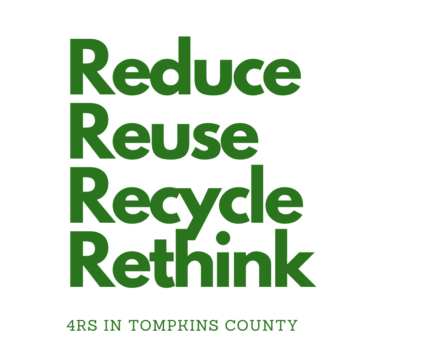4Rs in Tompkins County

The 4Rs (Reduce, Reuse, Recycling, and Rethink) provide guidance on handling the materials we generate. Reducing and reusing requires minimal inputs, eliminating waste before it is created, and using items for as long as possible. Recycling, the third R, offers another life for the materials we cannot reduce or reuse. Rethinking comes at the end of the cycle, as we help close the loop, purchasing items with recycled content, considering strategies for systems improvement, and laying the groundwork for a circular economy. By practicing the 4Rs, we save resources, reduce greenhouse gas emissions, create jobs, and close the loop, maybe even saving money along the way
Reduce
Preventing waste means that we don’t create it in the first place. We can reduce waste by changing our purchasing practices and behaviors, including the types of products and packaging that we buy. Reducing what is used can cut down on the volume or toxicity of the waste stream. Because we don’t create this material, we avoid all the environmental impacts and costs of producing a product in the first place.
Ways to reduce:
- Use your own container to buy products in bulk.
- Purchase concentrates (i.e., cleaning supplies) to cut down on product volume and packaging.
- Purchase items loose instead of prepackaged.
- Borrow tools or other items from a friend or use a rental service instead of buying infrequently used items.
- Choose multipurpose items that fulfill several functions.
- Reduce impulse buys by making a list before going grocery shopping, and sticking to it while in the store; consider large purchases for at least 24 hours before committing.
Reuse
To reuse something means to use it over again. This can happen when an item is used for its original purpose or for a new one. Reuse is a great way to extend the life of goods that we already have, minimize the need for new items, and keep materials out of the landfill.
Ways to reuse:
- Shop at secondhand stores: reusetrail.com.
- Choose items in refillable packaging.
- Mend or repair items, like clothing or furniture, instead of discarding them.
- Donate unwanted goods that still have life.
- Use the back of scrap paper.
- Wash a cloth towel or dishes to use them over and over again instead of buying disposable.
Recycle
At its basic form, to recycle means to change the original form of a waste material to create a new product. For instance, an old soda bottle may be collected and processed into new polar fleece; an empty aluminum can might be melted down and made into a new one; or used tires might be processed into a rubber floor mat.
When it comes to recycling, you’ll notice that we don’t just talk about curbside single stream recycling anymore. Recycling is much bigger than this. You can now bring many additional items to the Recycling and Solid Waste Center. Food scraps recycling, a form of composting, is also expanding locally, with drop spots around the county.
Ways to recycle:
- Set paper and containers at the curbside for recycling collection.
- Redeem deposit bottles and cans.
- Take grocery bags back to the retailer.
- Bring additional items, like food scraps, electronics, scrap metal, fluorescent tubes, and fire extinguishers to the Recycling and Solid Waste Center.
- Compost fruit and vegetable peels in a backyard bin or at a drop spot.
Rethink
The fourth R is Rethink, which challenges us to consider how we think about goods and products in our lives. By rethinking our waste, we shift our mindset, current habits, and other practices to support a circular economy where materials are maintained at their highest value for as long as possible, and products at their end-of-life become inputs for new systems. Green purchasing, for example, is a form of rethinking that leads to buying goods that reduce waste, support reuse, and can be recycled. When we purchase items with recycled content, we increase demand for these items, which means there are companies who want our collected recyclables.
Ways to rethink:
- Borrow or share items you use on a limited basis.
- Look for durable goods that can be used over and over.
- Buy items with recycled content.
- Purchase goods with no or minimal packaging.
- Seek out products that are local.